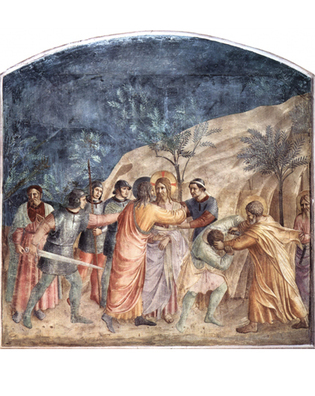 loading
loading
FindingsThe Prince of Peace?A professor argues that Jesus and his followers were armed.  WikipediaThe Capture of Christ, fresco by Fra Angelico (c. 1395–1455), Florence, Italy. View full imageIn a provocative reading of the Gospels, a Yale professor suggests that Christ and his disciples were—at least on one fateful occasion—armed with swords and prepared for holy war. “I’d call Jesus a strategic, rather than an absolute, pacifist,” says religious studies professor Dale B. Martin ’88PhD. One key source for his argument is a verse in the Gospel of Mark (14:47) about the arrest of Jesus in Gethsemane: “One of those [disciples] standing there drew a sword and struck the slave of the high priest and cut off his ear.” “If Mark’s Gospel were the only account we had, we would assume, I think, that the group, as a group, was armed,” writes Martin, in the September issue of the Journal for the Study of the New Testament. The Gospel of Luke (22:49) supports that idea: a disciple asks Jesus, just before the ear-slashing incident, “Lord, should we strike with the sword?” In Rome, only designated individuals could carry swords, and Martin says it is “almost certain” that the Roman forces occupying Jerusalem would have enforced the same prohibition. Leading a group of armed men into Jerusalem would have been grounds for crucifixion. In the other two Gospels, Jesus rebukes the sword-wielding disciple with the famous aphorism “All who take the sword will perish by the sword” and heals the slave’s ear. Martin says, however, that the incident may have been a later addition—to “whitewash the Jesus movement of any hint of being political or subversive.” Some experts question Martin’s interpretation, saying there’s no evidence of a prohibition against carrying swords in Jerusalem, and that the disciple’s “sword” could be a mistranslation for “knife.” But Martin notes that the Gospels call Christ a lestês—a term used by first-century Jewish historian Josephus for other Jews who mounted assaults against the authorities. Martin adds, “Jesus couldn’t have thought that a handful of fishermen and laborers was going to try to overthrow the Roman Empire. He was, however, an apocalyptic prophet. His group was armed because if God intervened, they wanted to be ready to join the battle.”
|
|
1 comment
-

Jay Greer (A.B. '54), 10:49am November 12 2014 |  Flag as inappropriate
Flag as inappropriate
The comment period has expired.There are other scriptural references that further confuse the picture of Jesus as a pacifist. See Luke 22:36, where Jesus tells his disciples "if you don't have a sword, sell your cloak and buy one."
See also Matthew 10:34: "I did not come to bring peace [to the earth] but a sword." Also see Joel 3:10: "Beat your plowshares into swords and your pruning hooks into spears. Let the weakling say 'I am strong'." Also Isaiah 2:4 and Micah 4:3. Jesus must have been familiar with all these texts, also suggest God has an aggressive side. In 2011 I heard a clergyman cite these passages when he appeared in the Connecticut legislature and opposed a bill that would have banned high-capacity magazines on the ground the bill was contrary to the Law of God. (The bill failed then, but in 2013 - after the Newtown shootings - the adopted such a provision as part of a package of bills relating to firearms.) I'm sure there are passages that point in the opposite direction but will leave it to others to report them.